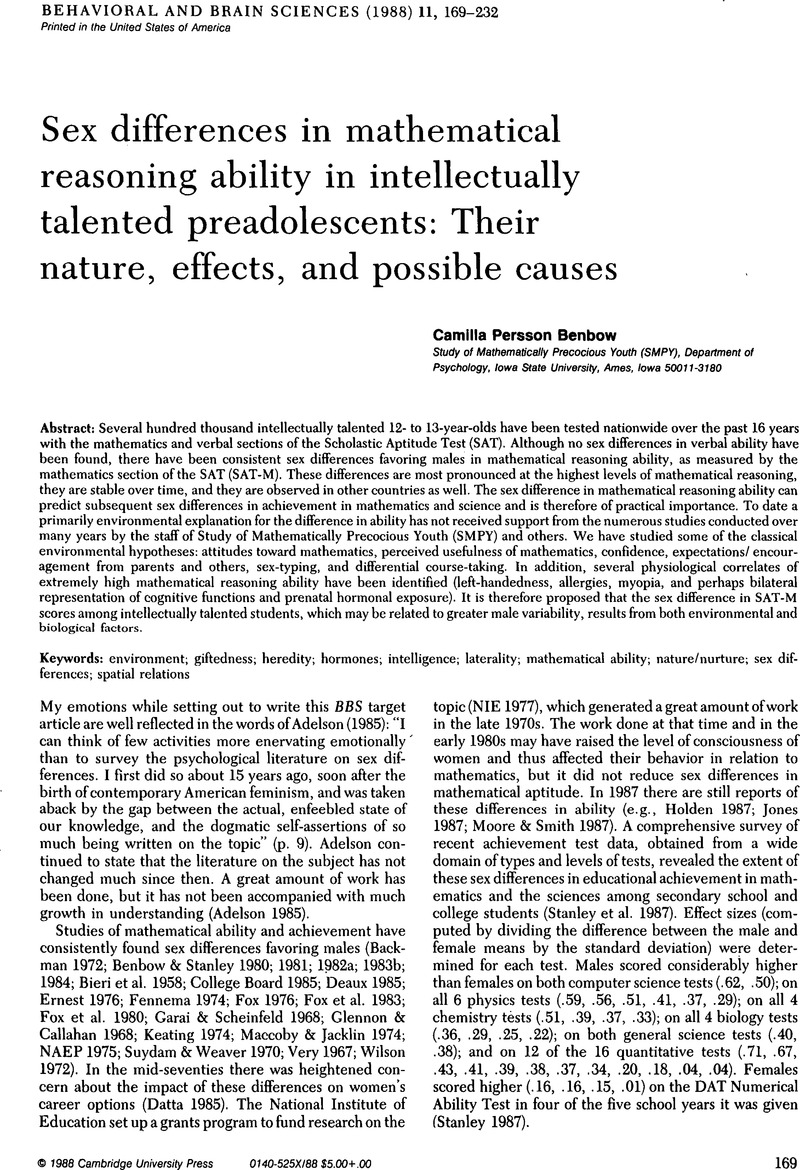Crossref Citations
This article has been cited by the following publications. This list is generated based on data provided by Crossref.
Lubinski, David
and
Humphreys, Lloyd G.
1990.
A broadly based analysis of mathematical giftedness.
Intelligence,
Vol. 14,
Issue. 3,
p.
327.
Feingold, Alan
1992.
Sex Differences in Variability in Intellectual Abilities: A New Look at an Old Controversy.
Review of Educational Research,
Vol. 62,
Issue. 1,
p.
61.
Lubinski, David
and
Humphreys, Lloyd G.
1992.
Some bodily and medical correlates of mathematical giftedness and commensurate levels of socioeconomic status.
Intelligence,
Vol. 16,
Issue. 1,
p.
99.
Thomas, Hoben
1993.
A theory explaining sex differences in high mathematical ability has been around for some time.
Behavioral and Brain Sciences,
Vol. 16,
Issue. 1,
p.
187.
Hedges, Larry V.
and
Friedman, Lynn
1993.
Gender Differences in Variability in Intellectual Abilities: A Reanalysis of Feingold’s Results.
Review of Educational Research,
Vol. 63,
Issue. 1,
p.
94.
Witt, Elizabeth A.
Dunbar, Stephen B.
and
Hoover, H.D.
1994.
A Multivariate Perspective on Sex Differences in Achievement and Later Performance Among Adolescents.
Applied Measurement in Education,
Vol. 7,
Issue. 3,
p.
241.
Stumpf, Heinrich
and
Jackson, Douglas N.
1994.
Gender-related differences in cognitive abilities: Evidence from a medical school admissions testing program.
Personality and Individual Differences,
Vol. 17,
Issue. 3,
p.
335.
Stumpf, Heinrich
and
Eliot, John
1995.
Gender-related differences in spatial ability and the k factor of general spatial ability in a population of academically talented students.
Personality and Individual Differences,
Vol. 19,
Issue. 1,
p.
33.
Stumpf, Heinrich
1995.
Gender differences in performance on tests of cognitive abilities: Experimental design issues and empirical results.
Learning and Individual Differences,
Vol. 7,
Issue. 4,
p.
275.
Chipman, Susan F.
1996.
Still far too sexy a topic.
Behavioral and Brain Sciences,
Vol. 19,
Issue. 2,
p.
248.
Kornbrot, Diana Eugenie
1996.
Resources dimorphism sexual selection and mathematics achievement.
Behavioral and Brain Sciences,
Vol. 19,
Issue. 2,
p.
259.
Hammer, Christy
and
Dusek, R. Valentine
1996.
Brain differences, anthropological stories, and educational implications.
Behavioral and Brain Sciences,
Vol. 19,
Issue. 2,
p.
257.
Wynn, Thomas
Tierson, Forrest
and
Palmer, Craig
1996.
Sex differences and evolutionary by-products.
Behavioral and Brain Sciences,
Vol. 19,
Issue. 2,
p.
265.
Davis, Hank
1996.
Is there a comparative psychology of implicit mathematical knowledge?.
Behavioral and Brain Sciences,
Vol. 19,
Issue. 2,
p.
250.
Charness, Neil
and
Gerchak, Yigal
1996.
Participation Rates and Maximal Performance: A Log-Linear Explanation for Group Differences, Such as Russian and Male Dominance in Chess.
Psychological Science,
Vol. 7,
Issue. 1,
p.
46.
Zohar, Ada H.
1996.
Genetic influences on sex differences in outstanding mathematical reasoning ability.
Behavioral and Brain Sciences,
Vol. 19,
Issue. 2,
p.
266.
Proudfoot, Diane
1996.
The logic of the sociobiological model Geary-style.
Behavioral and Brain Sciences,
Vol. 19,
Issue. 2,
p.
261.
Rowe, David C.
1996.
The twain shall meet: Uniting the analysis of sex differences and within-sex variation.
Behavioral and Brain Sciences,
Vol. 19,
Issue. 2,
p.
262.
Gillger, Jeffrey W.
1996.
Sex differences in mathematical abllity: Genes, environment, and evolution.
Behavioral and Brain Sciences,
Vol. 19,
Issue. 2,
p.
255.
Feingold, Alan
1996.
On an evolutionary model of sex differences in mathematics: Do the data support the theory?.
Behavioral and Brain Sciences,
Vol. 19,
Issue. 2,
p.
252.



